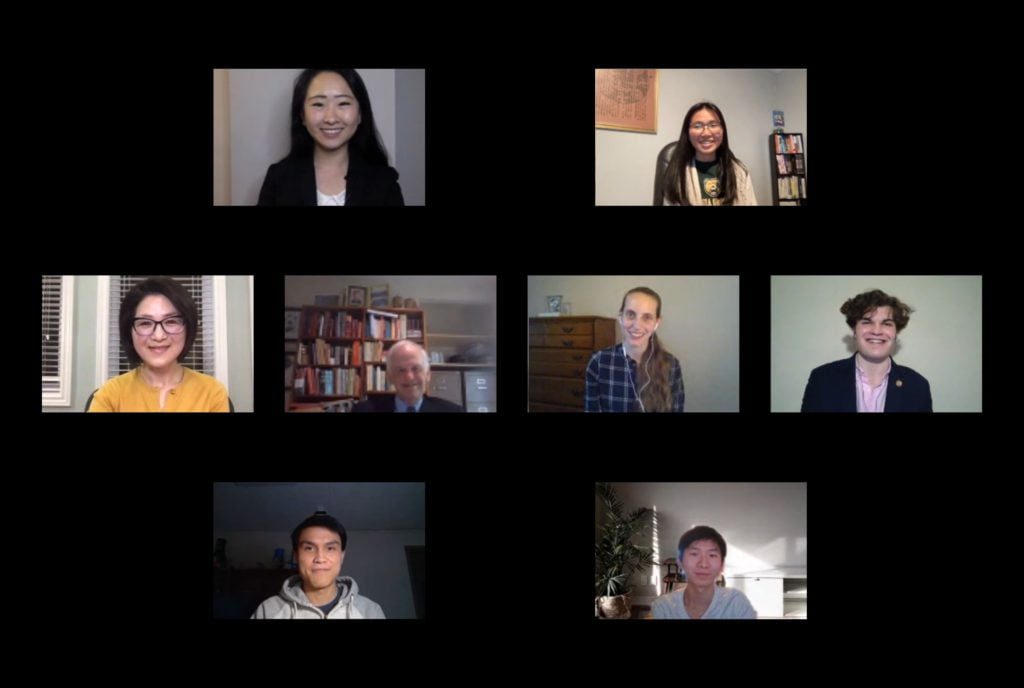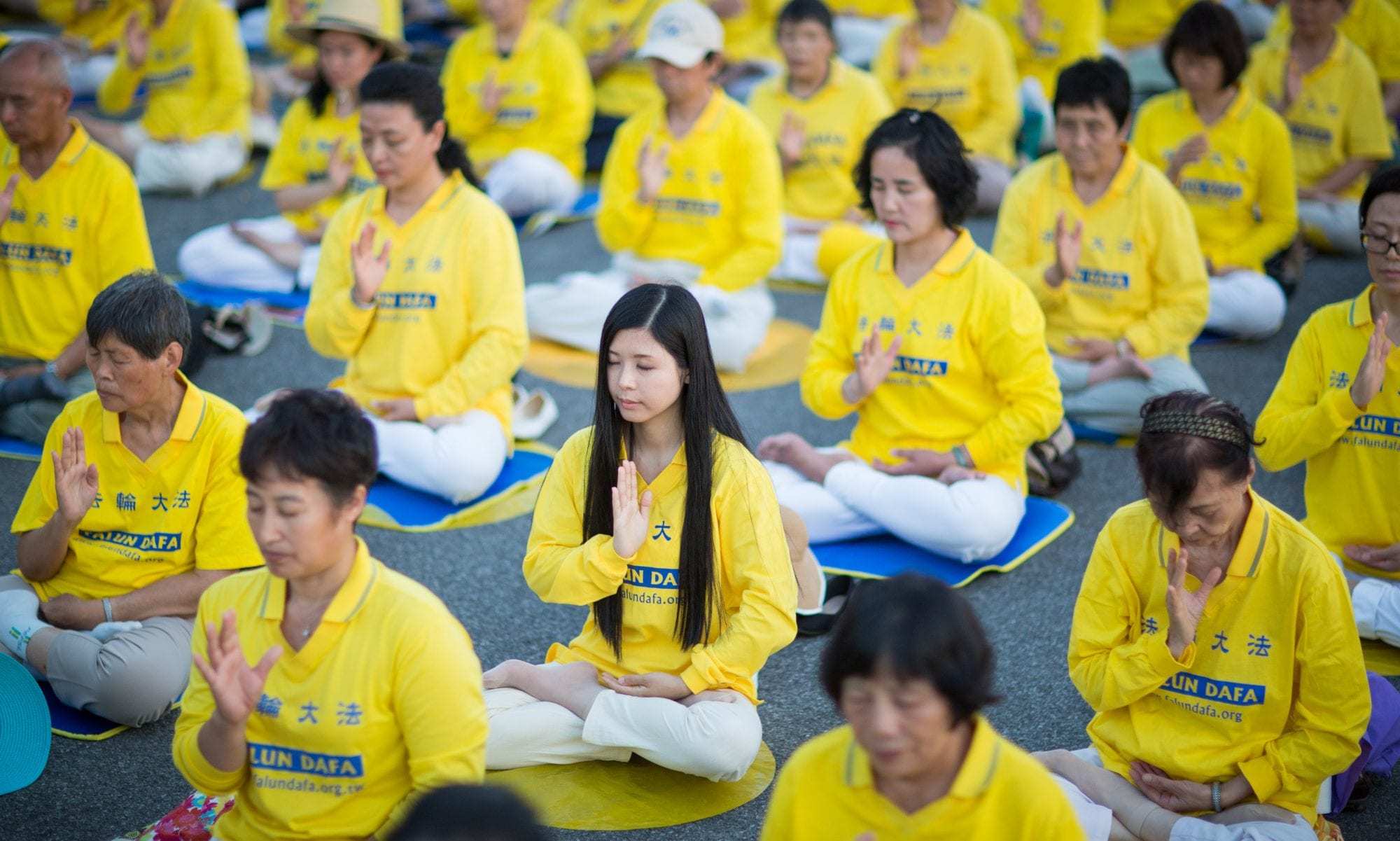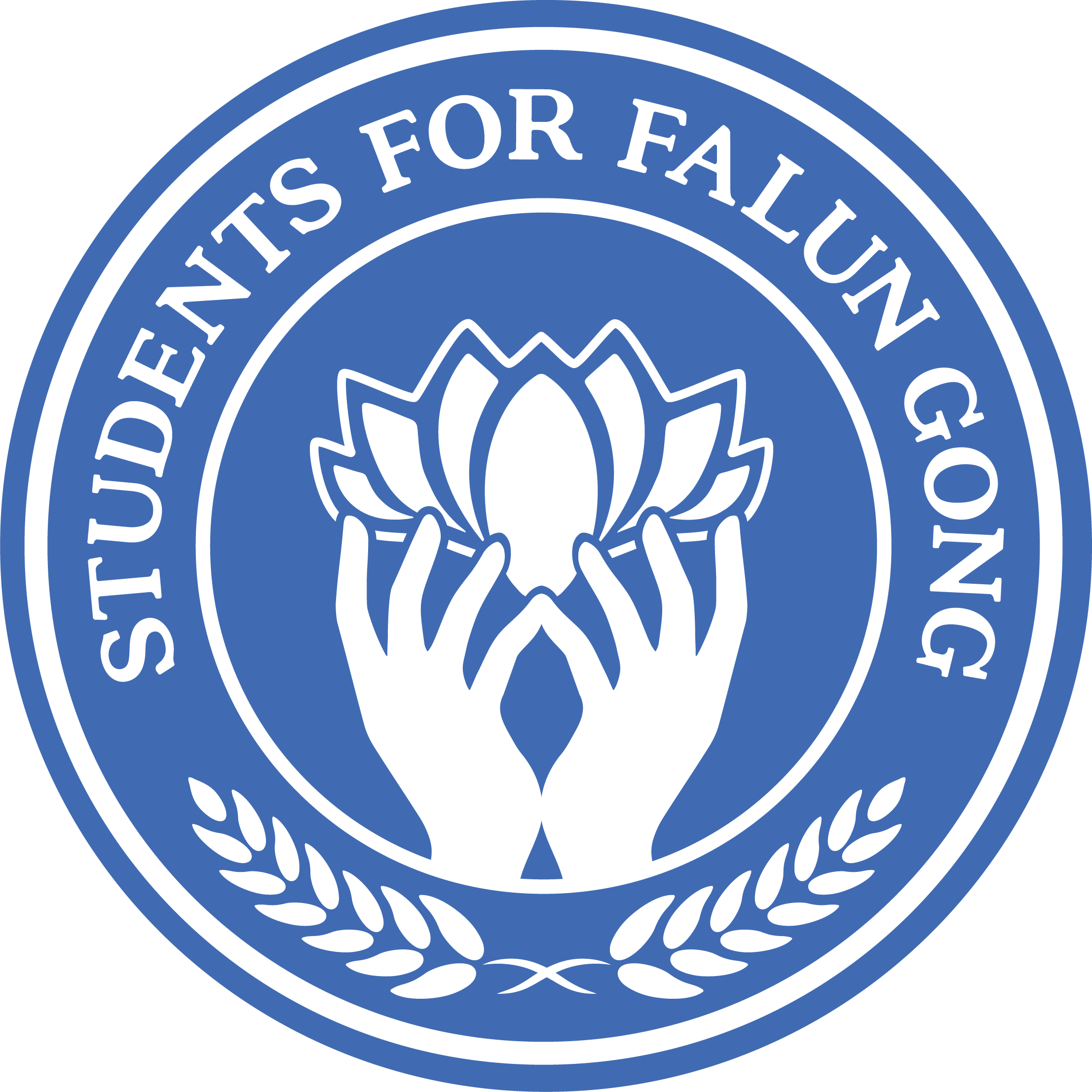Students for Falun Gong, Students for a Free Tibet, the Athenai Institute, and Falun Dafa Clubs on over 10 college campuses across North America hosted an online screening of the documentary In the Name of Confucius on Saturday, March 20. Over 180 people watched the film and attended the panel discussion.
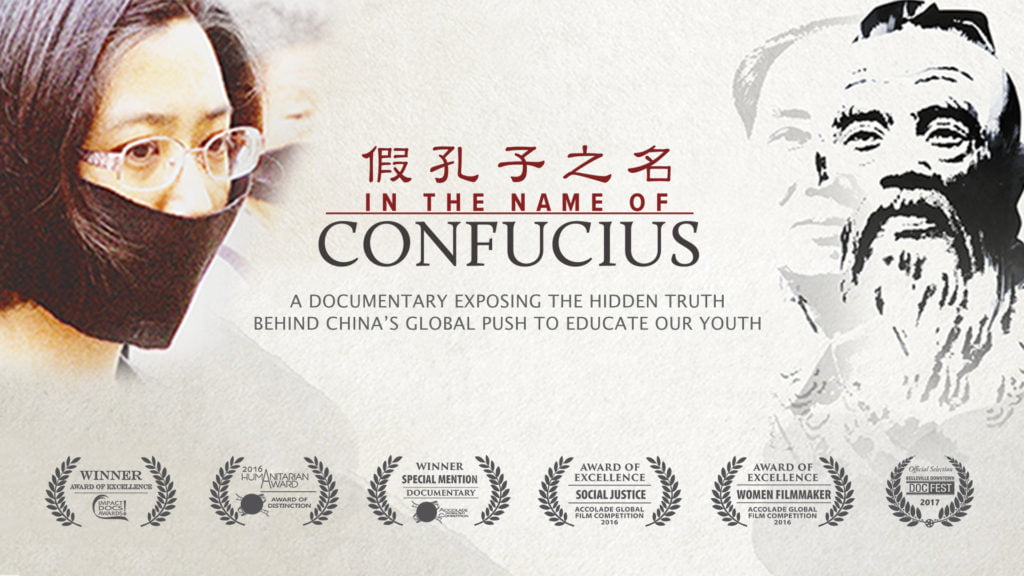
About the Film
In the Name of Confucius is the first documentary exposé of China’s multi-billion dollar Confucius Institute (CI) program, and the growing global controversies surrounding it—loss of academic integrity, foreign influence, violations to human rights codes, and even potential infringements on national security.
The award-winning film examines the reasons universities and schools welcome or reject the CI program. It provides an important and timely perspective on some of the unintended outcomes of our strengthening ties with a rising Communist China, as Beijing spends an estimated $10-billion annually on “external propaganda”, including the Confucius Institute initiative.
As of March 12, 2021, there are a total of 61 Confucius Institutes in North America, 51 in the United States [NAS], and 10 in Canada [NP].
The Panelists
Four expert panelists discussed Confucius Institutes, US-China relations, academic freedom, and other related topics.

Doris Liu is the producer, director, and writer of In the Name of Confucius. The film has been translated into 12 languages and has screened in over 20 countries across the world. During her travels with the film, what struck her the most was that educators –whom she regards should be the champion of academic freedom, free speech, and human rights – were willing to sacrifice those values for the immediate pragmatic interests they could receive from Confucius Institutes and the Chinese government.

Professor Link, a renowned sinologist, started out by emphasizing the importance of distinguishing between the Community Party of China (CPC) and China itself, a distinction which he observed was made in the documentary as well. He noted that the purpose of the Confucius Institutes is to spread the prestige of the Communist Party of China around the world. Their technique is to use Chinese culture (the Great Wall, pandas, Chinese characters and food, Confucius himself) to stimulate good feelings and harness those good feelings and pull them behind the prestige of the CPC.
Professor Link said that the main problem with Confucius Institutes is that they omit important parts of history, such as the “Great Leap Forward”, the “Cultural Revolution”, the June 4th massacre, the Xinjiang genocide, the crushing of Hong Kong, Taiwan Autonomy, Tibet and the Dalai Lama, Falun Gong, etc, that led to millions of unnatural deaths. With this approach, he said “the audience loses twice”: the things that are omitted would not be known, and the visible part will appear different when the invisible part is hidden.

Rachelle Peterson has researched Confucius Institutes for the last 6 years with the National Association of Scholars. She spoke of one of her visits to a Confucius Institute class at Alfred University in upstate New York. She had gotten permission to visit the CI class in advance. 5 minutes into the class, the Provost of the university walked in, called her out by her name, took her into the hallway, told her she was not welcome at the university, and escorted her back to her car. The Provost then again said Rachelle was not welcome on campus and that she cannot come back. Upon hearing this, a staff member of a Congressman said “that sounds like a little piece of Chinese government on a college campus”.
Rachelle also talked about the post-Confucius Institute world (in the US.). She described that even though the number of CIs is declining, it does not mean that they will go away, but rather, are being replaced by newly established centers with a similar name such as “China Institute”. These retain many of the CI staff, CI teaching materials, in certain cases the funding of Hanban, and operate similarly to Confucius Institutes. NAS’s ongoing work, “What happens when Confucius Institutes close” is examining the closures, and the new arrangements and partnerships that follow.

Rory O’Connor is the President of the Athenai Insitute, a student-led non-profit organization whose mission is to remove the influence of the Chinese Communist Party from academic institutions. He highlighted the paramount role of students in addressing Confucius Institutes, because faculty may not have the means to address them on their own. Rory cited the example of Tufts University and its recent closure of its CI announced on March 17, 2021. He said it took 3 years of pressure and 13 weeks of protests by different student organizations from the Tibetan, Hong Kong, Taiwanese, and Falun Gong communities.
One of his main concerns was that the people who are running the CI institutes were oftentimes the victims of what is being perpetuated. He recounted the case where a board member of a CI approached him and his friends expressing regret about having brought the CI on campus.
Questions from the Audience
The panel discussion lasted 90 minutes and covered issues such as
- the outlook of the current US. administration limiting the influence of Confucius Institutes
- the conflation of the ideas of Chinese culture and Confucius Institutes as well as the Communist Party of China and the Chinese nation
- the motivations of the hosting universities to partner with Hanban
- the recent bill to establish limitations on CIs that was passed by the US. Senate and its prospects of making it to the US. House of Representatives
- and many more.
You can view the full Q&A session at the link below:
From the Audience
The documentary filmmaker did an excellent job showing both sides of the issue of CI schools. I had not heard of them and have been educated that they exist and want to learn more. Thank you for this empowering knowledge.
Jack B. thought “The [TBSD] school board discussion was the most interesting”. When asked about what he would remember about the event, he said “I will remember Professor Link’s squirrel illustration during the panel discussion about what the CIs omit makes the students lose in two ways: 1. They don’t have an accurate picture of what is presented 2. They don’t get the truth about the dark side of the CCP.”
Rebecca learned about the “spread of the CI and how so many people just turn their head because of money”. She also noted that “I had no idea about these institutes and that there were some in my own state.”
Nathalie D. found “Doris Liu and Perry Link’s interventions particularly interesting, specially the part where Doris explained how she discovered the truth about Tiananmen and Falun Gong persecution and realized she’s been brainwashed.” She also remarked that “This is exactly what’s going on nowadays in the West, I think many people are waking up to another kind of brainwash they’ve been going through, and others are still denying it.”
And finally, Renee sent her compliments:
“It’s a very valuable documentary and discussion. […] I hope more people know this excellent Film.”
Conclusion
For decades, the Chinese Communist Party (CCP) has used various means to exert influence on foreign governments, manipulate global perception of the Chinese government, and silence critics. While the CCP has a history of utilizing direct political and economic threats, it also often uses soft power tactics such as economic bribery, honey traps, and business deals to covertly expand its influence. These soft power techniques also include the establishment of hundreds of Confucius Institutes around the world.
Traditional Chinese culture is a worldwide source of attraction, and in recent years the CCP has created the Confucius Institute– an educational partnership with universities around the world to promote Chinese language and culture and facilitate cultural exchange. In reality, these Confucius Institutes are veiled efforts to advance CCP propaganda and export censorship to international university campuses. Confucius Institutes have faced backlash from Tibetan, Hong Kong, Uighur, Vietnamese, and Taiwanese communities, as well as from governments around the world. Most recently, the United States Senate unanimously approved a bill to tighten controls on Confucius Institutes across the country.
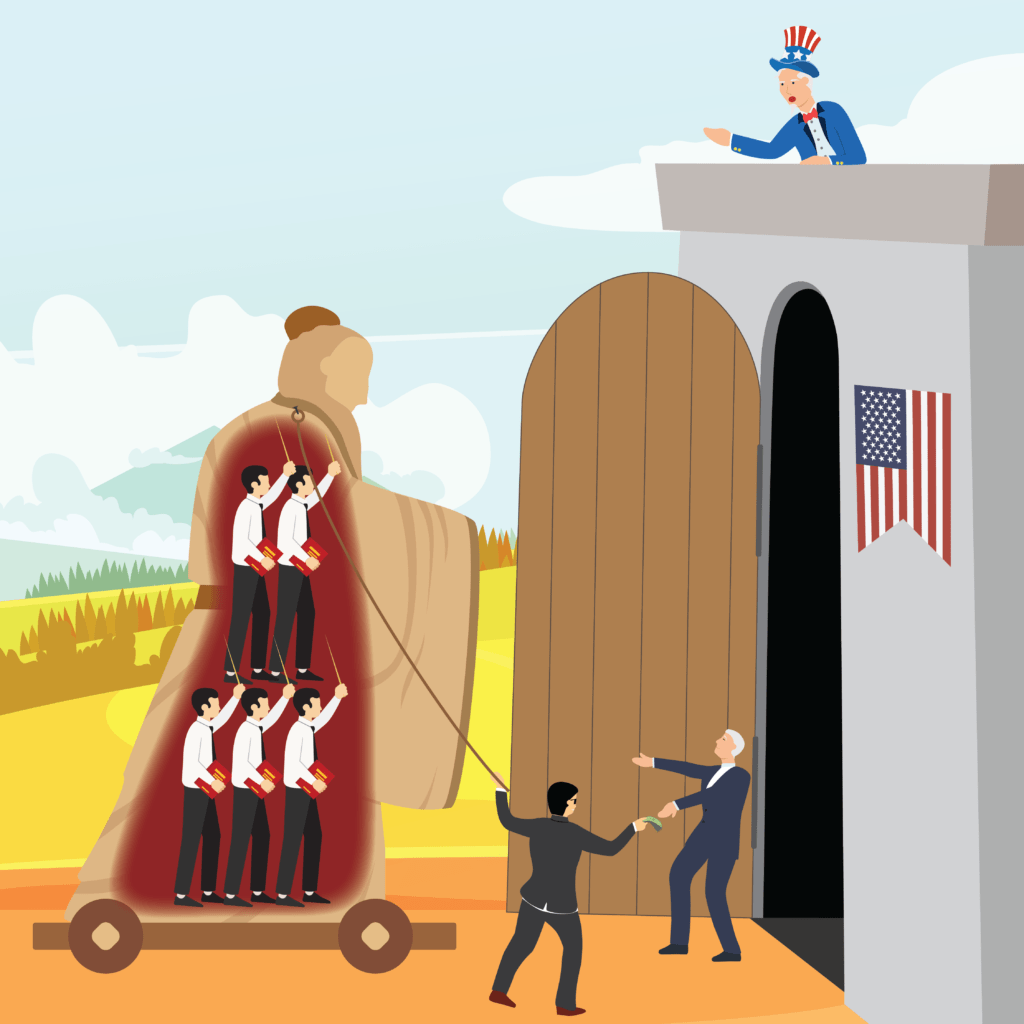
A Modern Trojan Horse
Learn More
If you missed the documentary, you can catch up on that over here: https://inthenameofconfuciusmovie.com/watch-online-en/
If you’d like to dive deeper into the issues revolving around the Confucius Institutes, please take a look at the following research work, review essays, and projects done by the panelists:
Doris’ presentation on “The Issue of the Confucius Institute”.
Rachelle’s groundbreaking report Outsourced to China: Confucius Institutes and Soft Power in American Higher Education
Prof. Link’s review essay on Confucius Institutes, Confucius Murders Squirrels
Rory’s Washington Appeal project. During the panel discussion, he referred to Marshall Sahlins’ efforts to address CIs from the faculty’s side in 2014, and to the GAO report.
Hosts
Students for Falun Gong
Athenai Institute
https://www.athenai.org/
Students for a Free Tibet
https://studentsforafreetibet.org/

